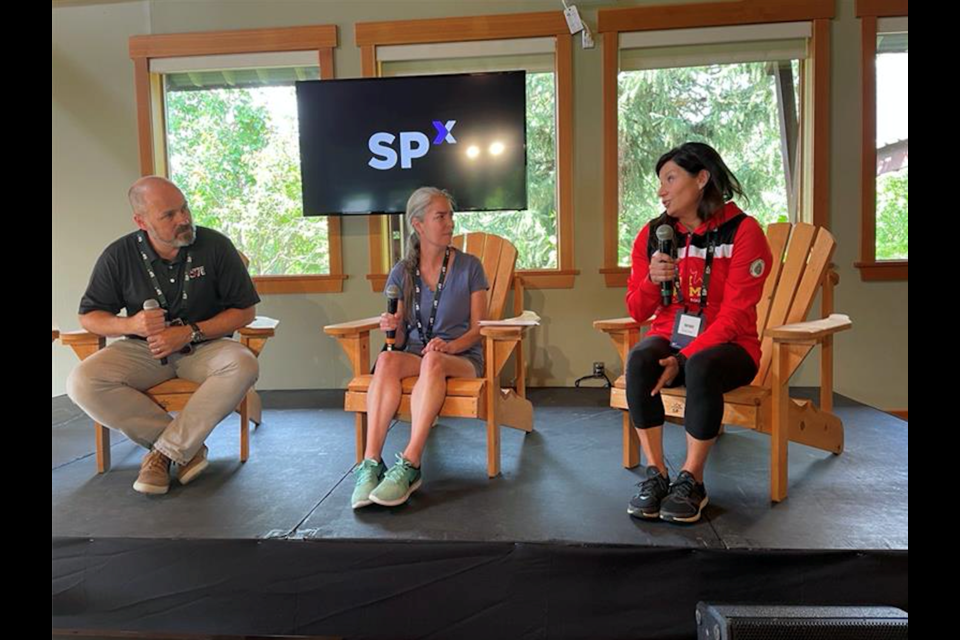After nearly two decades at the helm of the Whistler Adaptive Sports Program (WASP), former executive director Chelsey Walker is moving on to a new role—but that doesn’t mean she’s moving on from advocating for accessibility in sport.
She officially announced her new gig as director of Whistler operations with the Invictus Games Vancouver-Whistler on Wednesday, Oct. 26.
In April, Whistler learned it would host the first-ever hybrid summer-winter Invictus Games in 2025. The multi-sport Games were founded by Prince Harry, Duke of Sussex, in 2014 to offer wounded, injured and sick servicemen and women—both veterans and those actively serving—the chance to represent their countries in competition.
The new job is a natural fit for Walker—as WASP’s executive director, she was instrumental in bringing the Invictus Games to Whistler in the first place. As Walker told Pique, the hybrid idea traces back to a conversation she had with former Royal Foundation board member Martin Colclough during an Allied Winter Sports Camp WASP hosted in Whistler with Soldier On Canada back in 2015. After building Whistler’s successful bid, the Invictus Games invited Walker to join the organizing team in a more official capacity.
Still, stepping down from WASP wasn’t easy, Walker acknowledged. The lifelong Sea to Sky local was raised in the resort by a mom who was a volunteer with Whistler Adaptive, and with a grandfather who was visually impaired himself. “I grew up in a family where there was no limitation based on things like sensory disability—he was a powerhouse,” she said.
Walker first joined Whistler Adaptive in 2005, after a back injury put a snag in her career as a heli-ski guide and coach. To name just a few of her accomplishments in the 17 years since, Walker has helped harness numerous adaptive sport legacies from the 2010 Paralympic Games; grew WASP into a geographically diverse, 18-sport program; oversaw the fundraising and creation of a permanent adaptive sports centre on Whistler Mountain; and developed the allied camps with Soldier On Canada.
Choosing to leave “was a very bittersweet decision to make, because of all the good work that hundreds of people have put into Whistler Adaptive over the years, and the number of individuals that we've met and whose lives were transformed through the power of sport,” she said. “However, five years ago, my husband was diagnosed with PTSD, and the chance to work with a community that is largely based on the PTSD community was just such a huge opportunity for me to move into a space that was going to be helping families like mine.”
Shelley Milstein only came onboard as WASP’s director of philanthropy in March 2022, but her first encounter with Walker came during a summer adaptive sport camp six years earlier, when Milstein was working for Spinal Cord Injury BC.
“She's been a huge advocate and a real pioneer in adaptive sports, particularly winter adaptive sports,” said Milstein. “She really likes to push the envelope and push people to be better and try harder in terms of inclusion and accessibility. She's helped pioneer the sport of adaptive mountain biking, which is really exciting, especially for the … Sea to Sky community, where mountain biking has taken off just as much as the winter sports have, in this area.
“People with disabilities want to get out there just as much as anybody else, and she's really helped to create a space and tools for that to happen.”
Milstein is currently serving as interim executive director following Walker’s departure.
“It's definitely some big shoes to fill. Chelsey gave her heart and soul and a lot of her time, frankly, to build this organization. She sacrificed a lot in the in the name of Whistler Adaptive to be able to … bring it to what it is now.” The WASP team “hopes to be able to carry on that legacy,” Milstein added.
“This is an incredibly exciting opportunity for her, and we look forward to working alongside her in this,” she said. “We're very happy and grateful that she's not going far away.”
Speaking of the Invictus Games’ origins, there is one recurring question Walker said she’s been fielding since the news began floating through the community. The answer? “Contrary to popular belief, Prince Harry did not call me personally and ask me to join the team,” she said with a laugh.
Walker’s role is embedded in the host corporation for this particular event, she explained, likening the group to a local organizing committee in an Olympic context. “I’m not moving to London,” she clarified, “this is very much a local opportunity.”




